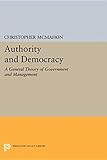Authority and Democracy : a General Theory of Government and Management / Christopher McMahon.
Material type: TextSeries: Studies in Moral, Political, and Legal Philosophy SerPublisher: Princeton, NJ : Princeton University Press, [2017]Copyright date: ©2017Description: 1 online resource : 3 line illustrationsContent type:
TextSeries: Studies in Moral, Political, and Legal Philosophy SerPublisher: Princeton, NJ : Princeton University Press, [2017]Copyright date: ©2017Description: 1 online resource : 3 line illustrationsContent type: - text
- computer
- online resource
- 1400887461
- 9781400887460
- 9780691603216
- 0691603219
- 350 23
- HM271 .M39 2017eb
| Item type | Home library | Collection | Call number | Materials specified | Status | Date due | Barcode | |
|---|---|---|---|---|---|---|---|---|
 Electronic-Books
Electronic-Books
|
OPJGU Sonepat- Campus | E-Books EBSCO | Available |
Print version record.
Frontmatter -- CONTENTS -- PREFACE -- ONE: INTRODUCTION -- Part I: Authority in General and in Government -- Two: AUTHORITY -- THREE: MORAL PRINCIPLES AND SOCIAL FACTS -- FOUR: THE JUSTIFICATION OF AUTHORITY -- FIVE: DEMOCRACY -- Part II: Managerial Authority -- Six: MANAGEMENT AND MORALITY -- SEVEN: MANAGERIAL AUTHORITY AS P-AUTHORITV -- EIGHT: MANAGERIAL AUTHORITY AS C-AUTHORITY -- NINE: MANAGERIAL DEMOCRACY -- WORKS CITED -- INDEX
Should the democratic exercise of authority that we take for granted in the realm of government be extended to the managerial sphere? Exploring this question, Christopher McMahon develops a theory of government and management as two components of an integrated system of social authority that is essentially political in nature. He then considers where in this structure democratic decision making is appropriate. McMahon examines the main varieties of authority: the authority of experts, authority grounded in a promise to obey, and authority justified as facilitating mutually beneficial cooperation. He also discusses the phenomenon of managerial authority, the authority that guides nongovernmental organization, and argues that managerial authority is best regarded not as the authority of a principal over an agent, but rather as authority that facilitates mutually beneficial cooperation among employees with different moral aims. Viewed in this way, there is a presumption that managerial authority should be democratically exercised by employees. Originally published in 1997. The Princeton Legacy Library uses the latest print-on-demand technology to again make available previously out-of-print books from the distinguished backlist of Princeton University Press. These editions preserve the original texts of these important books while presenting them in durable paperback and hardcover editions. The goal of the Princeton Legacy Library is to vastly increase access to the rich scholarly heritage found in the thousands of books published by Princeton University Press since its founding in 1905.
In English.
eBooks on EBSCOhost EBSCO eBook Subscription Academic Collection - Worldwide
There are no comments on this title.

